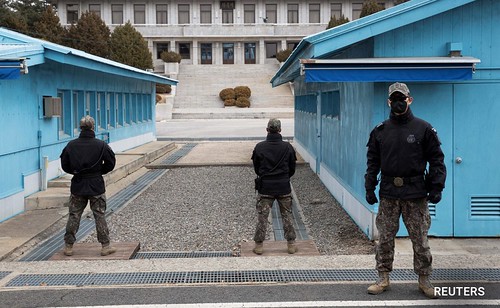North Korea says it will expel Travis King, the US soldier who crossed into the country in July
Travis King #TravisKing

By KIM TONG-HYUNG, MATTHEW LEE and LOLITA C. BALDOR (Associated Press)
SEOUL, South Korea (AP) — The U.S. soldier who sprinted into North Korea across the heavily fortified border between the Koreas two months ago was released into American custody Wednesday, according to two officials.
Earlier, North Korea said it would expel Pvt. Travis King — an announcement that surprised some observers who had expected the North to drag out his detention in the hopes of squeezing concessions from Washington at a time of high tensions between the rivals.
King’s expulsion almost certainly does not end his troubles or ensure the sort of celebratory homecoming that has accompanied the releases of other detained Americans.
And there remain unanswered questions about the episode, including why King went to North Korea in the first place. His fate also remains uncertain, having been declared AWOL by the U.S. government. That can mean punishment by time in military jail, forfeiture of pay or a dishonorable discharge.
King was transferred to American custody in China, according to one of the officials. The two U.S. officials spoke on condition of anonymity to discuss King’s status ahead of an announcement.
It was not clear what condition he was in. He is being taken to Brooke Army Medical Center at Fort Sam Houston in Texas, according to another U.S. official. He is expected to arrive overnight. The official spoke on condition of anonymity to discuss sensitive military movements.
King, who had served in South Korea, ran into North Korea while on a civilian tour of a border village on July 18, becoming the first American confirmed to be detained in the North in nearly five years.
At the time he crossed the border, King was supposed to be heading to Fort Bliss, Texas, following his release from prison in South Korea on an assault conviction.
On Wednesday, the North’s official Korean Central News Agency reported that authorities had finished their questioning of King. It said that he confessed to illegally entering the North because he harbored “ill feeling against inhuman maltreatment and racial discrimination” within the U.S. Army and was “disillusioned about the unequal U.S. society.”
It has attributed similar comments to King before, and verifying their authenticity is impossible. Some previous foreign detainees have said after their releases that their declarations of guilt while in North Korean custody were made under coercion.
In an interview last month with The Associated Press, King’s mother, Claudine Gates, said her son had reason to want to come home. She thanked the U.S. government on Wednesday for securing her son’s release.
“Ms. Gates will be forever grateful to the United States Army and all its interagency partners for a job well done,” Jonathan Franks, spokesperson for Gates, said in a statement. “For the foreseeable future, the family asks for privacy and Ms. Gates does not intend to give any interviews.”
King, who is from Wisconsin, was among about 28,000 U.S. troops stationed in South Korea as deterrence against potential aggression from North Korea. U.S. officials had expressed concern about King’s well-being, citing the North’s harsh treatment of some American detainees in the past.
Both Koreas ban anyone from crossing their heavily fortified shared border without special permissions. The Americans who crossed into North Korea in the past include soldiers, missionaries, human rights advocates or those simply curious about one of the world’s most cloistered societies.
North Korea’s decision to release King after 71 days appears relatively quick by the country’s standards, especially considering the tensions between Washington and Pyongyang over the North’s growing nuclear weapons and missile program and the United States’ expanding military exercises with South Korea. Some had speculated that North Korea might treat King as a propaganda asset or bargaining chip.
In the end, the North apparently concluded that King simply wasn’t worth keeping, possibly because of the cost of providing him food and accommodation and assigning him guards and translators when he was never to be a meaningful source of U.S. military intelligence, said Cheong Seong-Chang, an analyst at South Korea’s Sejong Institute.
Captive Americans have been flown to China previously. In other cases, an envoy has been sent to retrieve them.
That happened in 2017 when North Korea deported Otto Warmbier, an American college student who was in a coma at the time of his release and later died.
___
Lee and Baldor reported from Washington. Associated Press writer Eric Tucker in Washington also contributed.